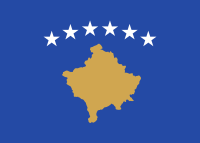Kosovo declares independence from Serbia
Sunday, February 17, 2008


Image: Thomas Guignard.

At 15:00 GMT today, Kosovo announced its independence from Serbia. Prime Minister Hashim Thaçi declared that Kosovo would become a democratic country and would respect the rights of all its communities. It is expected that several countries, including the United Kingdom, the United States and most members of the European Union, will recognise its independence on Monday. Serbia and Russia are against an independent Kosovo. Approximately 10% of Kosovars are of Serbian descent, the majority is Albanian.
The declaration was passed unanimously by the Kosovar parliament, who subsequently signed it. The Prime Minister told MPs that "We have waited for this day for a very long time", and that "the independence of Kosovo marks the end of the dissolution of the former Yugoslavia". He also said that Kosovo would be working to follow the plan drawn up by former Finnish president Martti Ahtisaari, and the United Nations. MPs have also selected a new flag (pictured on the right), showing the shape of the country in gold, on a blue background, with six white stars.
The Serbian Prime Minister, Vojislav Kostunica said that the declaration made Kosovo a "false state". Serbian Foreign Minister Vuk Jeremic had this to say about the declaration:
| “ | Let me be very clear. The Republic of Serbia shall never accept any violation of its territorial integrity. We shall never recognise Kosovo's independence. We shall not waiver, we shall not yield, should this cowardly act proceed unchecked. Not now. Not in a year. Not in a decade. Never. | ” |
He had previously said that if Kosovo were to declare independence, "we shall undertake all diplomatic, political and economic measures designed to impede and reverse this direct and unprovoked attack on our sovereignty."
International reaction
The British Foreign Office said that the declaration was "an important development which creates a new context for Kosovo status", and U.S. President George W. Bush said that he "strongly supported the Ahtisaari plan", which had resulted in the declaration.
Javier Solana, the European Union's co-ordinator of foreign policy said that "stability in Kosovo as well as of the whole Balkan region is essential", and that he is "convinced that the Kosovar leaders will be up to their responsibilities in this crucial moment". French foreign minister Bernard Kouchner said that he wished Kosovo good luck.
The Russian Foreign Ministry, however, said that they expected UN and NATO peacekeeping forces to "out their mandate" and take "tough administrative measures" against the declaration. The President of Russia, Vladimir Putin, has criticised European states that are backing the declaration by pointing out that other separatist groups like Basques in Spain and Turks in Northern Cyprus are not granted the same support. He has said that supporting Kosovo's announcement “...is not moral or legal”.
The Netherlands minister of Foreign Affairs, Maxime Verhagen, said that he wanted to study the constitution and the declaration of independence before supporting the new nation. Belgium Foreign Minister Karel De Gucht also welcomed the Ahtisaari to secure safety and stability in the region.
Sources
- "Kosovo MPs proclaim independence" — BBC News, February 17, 2008
- "Verhagen weigert snelle erkenning Kosovo" — Novum, February 17, 2008 (Dutch)
- "Kosovo celebrates independence, thanks the West" — EarthTimes.org, February 17, 2008
- "In quotes: Kosovo reaction" — BBC News, February 17, 2008
- "Reports: PM says Kosovo to declare independence Sunday" — CNN.com, February 17, 2008
- "Serbia defiant as Kosovo breakaway looms" — CNN.com, February 15, 2008
- "Putin criticizes European 'double standards'" — CNN.com, February 14, 2008
- "Kosovo roept onafhankelijkheid uit" — Nu.nl, February 17, 2008 (Dutch)